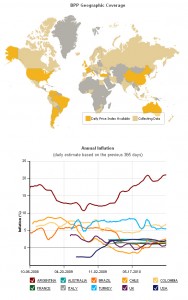Billion Prices Project: Introducing Real-Time Economics
-
-
slice.mit.edu
- 2
Filed Under
Recommended

The Billion Prices Project (BPP), an initiative started by a pair of alumni Sloan professors, collects prices from hundreds of online retailers around the world on a daily basis. The result is an Internet-based resource that measures price changes from around the world and gives real-time inflation estimates.
Currently BPP monitors daily price fluctuations of ~5 million items sold by ~300 online retailers in more than 70 countries. That’s a lot of numbers—and crunching them is producing results. Consult the Inflation Map, for example, to drill down to a country of interest for its daily price index and inflation rate for each of the past 365 days.
The co-founders, Alberto Cavallo MBA ’05 and Roberto Rigobon PhD '97, are both members of Sloan’s Applied Economics Group, with expertise in Latin American economics. They are also using the data to investigate price-stickiness, price adjustments to shocks, the relationship between asset and retail prices, sales strategies, and premiums paid for green or organic products around the world.
Index Universe says the project provides pricing data at much greater speed than conventional inflation indices, but also in greater detail across countries.
The article notes that this type of data also is helpful in countries where the official inflation statistics are unreliable: "MIT has been publishing alternative inflation estimates for Argentina since 2008, for example, and its index has become a widely used measure of inflation there. MIT estimates that annual inflation in Argentina is over 20 percent, compared to the government’s official figure of around 11 percent."
Read a News@MITSloan article for background on the project.








Comments
Burt Rothberg
Mon, 04/25/2011 2:43pm
Too bad. The data on it was just starting to get interesting.
As you might expect, the blogosphere is full of conspiracy theories about this being pulled by government order.
Jupiter
Mon, 04/25/2011 1:38am
MIT pulled this great economic tool citing lack of time and resources.